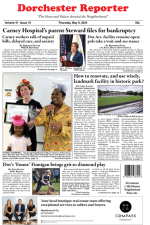September 3, 2015
Bicyclists in much of Dorchester are out of luck if they want to go for a convenient bike ride around their neighborhoods but don’t own their own bikes. However, a new Active Transportation Director and more Hubway stations may indicate there’s a shift coming in the priority given to cyclists on Dorchester streets.
The number of Bostonians who use bikes to commute to and from work rose from 1.3 percent to 1.7 percent from 2009 to 2012, as compared to the national average of 0.6 percent, according to the US Census Bureau’s American Community Survey. More people are biking, it reports, especially in the Northeast.
“We all have that story of the first ride. … That ‘aha’ moment that turned us onto cycling and all its possibilities,” said Noah Hicks, founder of the Bowdoin Bike School and bike shop, which hosts a series of weekly rides through partnerships.
Stefanie Seksin is the city’s first Active Transportation Director. Her duties – which began just two weeks ago – encompass “implementing new initiatives to create people-friendly designs and programs that encourage and sustain active transportation options and lifestyles,” Mayor Martin Walsh said in a statement when Seskin was appointed.
Her appointment and her work with the city’s Boston Bikes program coincide with a proposed Hubway expansion. The green and silver bike ports scattered across the city touch only the edge of Dorchester, a neighborhood with an active biking community but relatively few internal options for casual and safe biking, residents said.
Hubway expansions are “an important first step,” Hicks said, but the end goal should be to increase bicycle ownership and teach people how to reliably care for their bikes. He added that he hopes they can ride in the city without the stigma that shared roads aren’t meant for the physically vulnerable bikers.
It’s a stigma borne out in death and injury counts, as it turns out. Anita Kurrman, a 38-year-old medical researcher, was the latest of at least 13 bicyclist deaths in Boston in the last five years after some 520 crashes involving bikes annually, according to the Boston Globe’s archives.
Watching ghost bikes pop up on street corners, Dorchester bike enthusiasts have expressed consternation over what they see as an improvement schedule that is lax at best and insulting at worst.
“We’re basically getting zero new infrastructure,” said Philip Lindsay, a Dorchester resident of three decades and an avid biker. He and others pointed out inconsistencies in bike lanes along Massachusetts and Dorchester avenues as they move into Dorchester.
They said the lack of dedicated space leads to confusion over whether bikers are expected to act like cars or pedestrians.
“I feel like we’re getting left behind,” Hicks said. “All of Dorchester’s major roadways need to be looked at.”
The Hubway expansion may be a good start, but it has been a long time coming, cyclists say. Since 60 Hubways docks were introduced into Boston in 2011, 30 more have been placed within the city, according to Hubway and Boston Bike’s websites. Cambridge, Somerville, and Brookline also joined in on the project, bringing the total of Hubway stations to 140.
In Boston, the vast majority have been in the northern portions of the city, such as the financial district, Back Bay, and Fenway/Kenmore, with Dorchester playing host to four stations: Uphams Corner, E. Cottage Street at Columbia Road, JFK/UMass station, and the UMass Boston Integrated Sciences Complex. There are currently no Hubway stations south of Uphams Corner.
But that may change with the newest Hubway expansion. In a survey distributed online that just closed, Boston Bikes has asked for public input for 10 new docking stations. Five other bike locations will determined by sponsors, according to the Boston Bikes’ post.
Since the last expansion, in 2014, which added 10 stations on both sides of the Charles, Boston Bikes has received more than 33,000 suggestions for Hubway docks, they said. The proposed stations for this round “have focused on options that are close enough to the existing network to ensure the stations will be successful.”
In Dorchester, four potential stations are up for consideration: Uphams Corner Health Center, Dorchester Avenue at Savin Hill, Savin Hill T Station, and Four Corners.
The cost of a yearly Hubway membership is $85, but a subsidized membership costs $5, according to Boston Bikes, which counts 800 subsidized members. Those who have started out with a Hubway subsidized membership often enjoy the experience of biking enough that “they went out and bought a bike,” Hicks said. The expansion “plays a role in expanding biking infrastructure,” but not nearly quickly enough.
Boston Bikes declined a request to interview Seskin, citing the timing of her new position, and a Hubway spokesperson was unavailable to comment.
In a greeting through Boston Bikes’s newsletter, Seskin said she was familiar with the “epidemic of pedestrian deaths,” which is chronicled in a report, “Dangerous By Design.” As Boston has become a regular witness to bicycle fatalities and accidents, “safety and access are key to transportation, but we also need to think about impacts on public health, equity, and social resilience,” she said in the message.
Vineet Gupta, director of planning for the Boston Transportation Department, told the Reporter: “Dorchester as much as any other neighborhood is a priority when it comes to bike safety.”
He cited bike lanes on “long and big streets” such as Blue Hill Avenue, Freeport Street, and Talbot Avenue as part of the ongoing improvements.
City Hall is listening, he said, and residents are encouraged to reach out.



